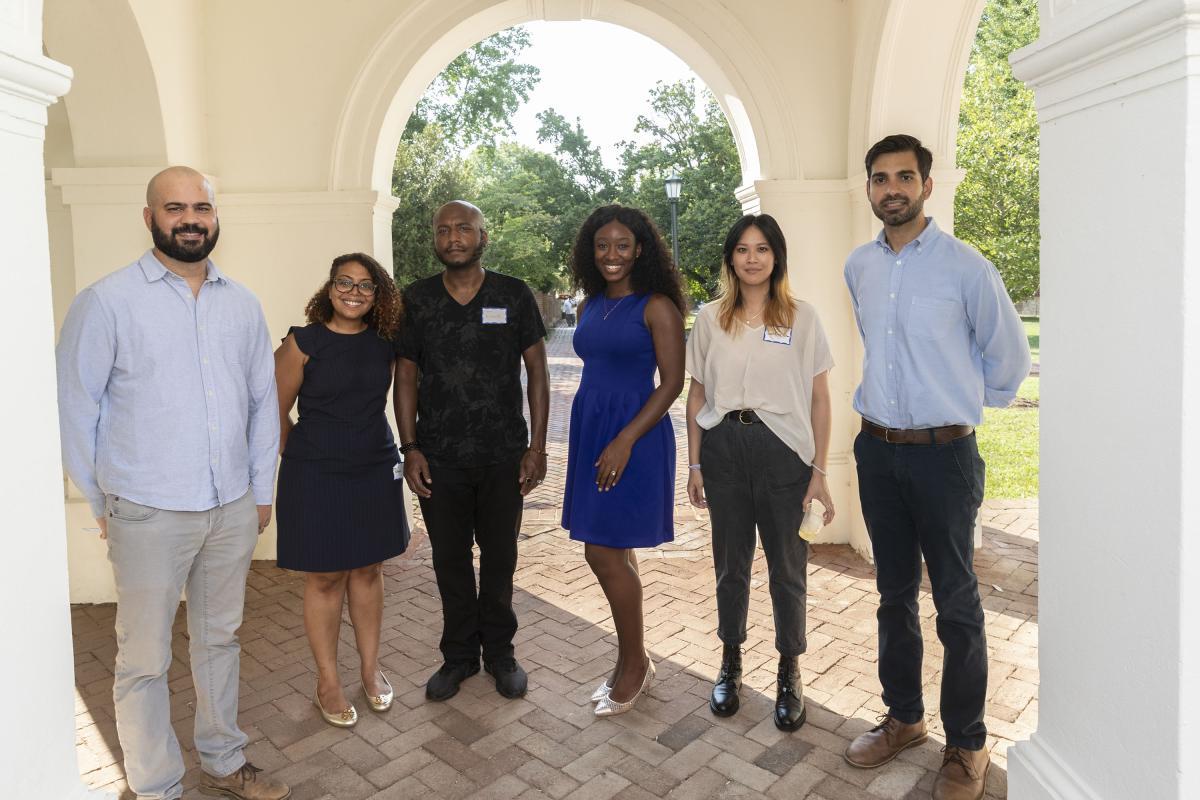- Prospective Students
- Current Students
- Faculty & Staff
-
How do I ...
- Graduate
- Enroll
- Other Actions
- External Resources
- Quick Links
- Contact Us
Rising Scholars Postdoctoral Fellows, 2022

Pietro de Mello (he/him/his)
uzt9rb@virginia.edu
Department of Biology
Subject: Evolution; Developmental Biology; Population Genetics; Color; Speciation; Adaptation.
Pietro is a Rising Scholar Postdoctoral Fellow in the Department of Biology at the University of Virginia. At UVa, Pietro's research aims to understand how traits are produced by the interaction of distinct types of cells during an organism's development. A trait, broadly speaking, is a characteristic of an individual. Examples in our species include hair color, height, the presence or absence of wisdom teeth, or even the propensity of developing a heritable disease. Given the shared genetic background of all living organisms (you, for example, share ~ 50% of your genes with corn), we can learn much about how traits are determined in our species by studying other organisms. This is why classic study systems in the field of genetics include fruit flies, mice, or fish.
Pietro's specific goal at UVa is to understand what genes and cell interactions are responsible for the differences in color pattern between male and female Trinidadian Guppies (also known as guppies). Male (XY chromosomes) and female (XX chromosomes) guppies are identical until they reach puberty. From that point onwards males start to grow more slowly then females, while also becoming considerably more colorful. Pietro's research will start to unveil the genetic and celular mechanisms that are responsible for the establishment of the distinct color patterns between male and female guppies. Questions include: How are color patterns established in males? Are they produced by a larger proliferation of color cells in males than females? What role does cellular migration across the skin play in establishing the male pattern? Do cells surrounding color cells play a role in the establishment of pattern through chemical cues? Or are guppy patterns self-assembling? What genes or hormones trigger the process of differentiation? How is the male color patterned maintained through time? By studying traits that differ between male and female guppies Pietro aims to understand how differences in the regulation of genes shared between organisms in a single species can produce drastically distinct traits.
Pietro received his Ph.D.in Ecology and Evolutionary Biology with honors at the University of Kansas, his M.Sc. in Ecology as well as his B.Sc. and Licentiate degrees in Biology at the Universidade de Brasilia, Brazil.
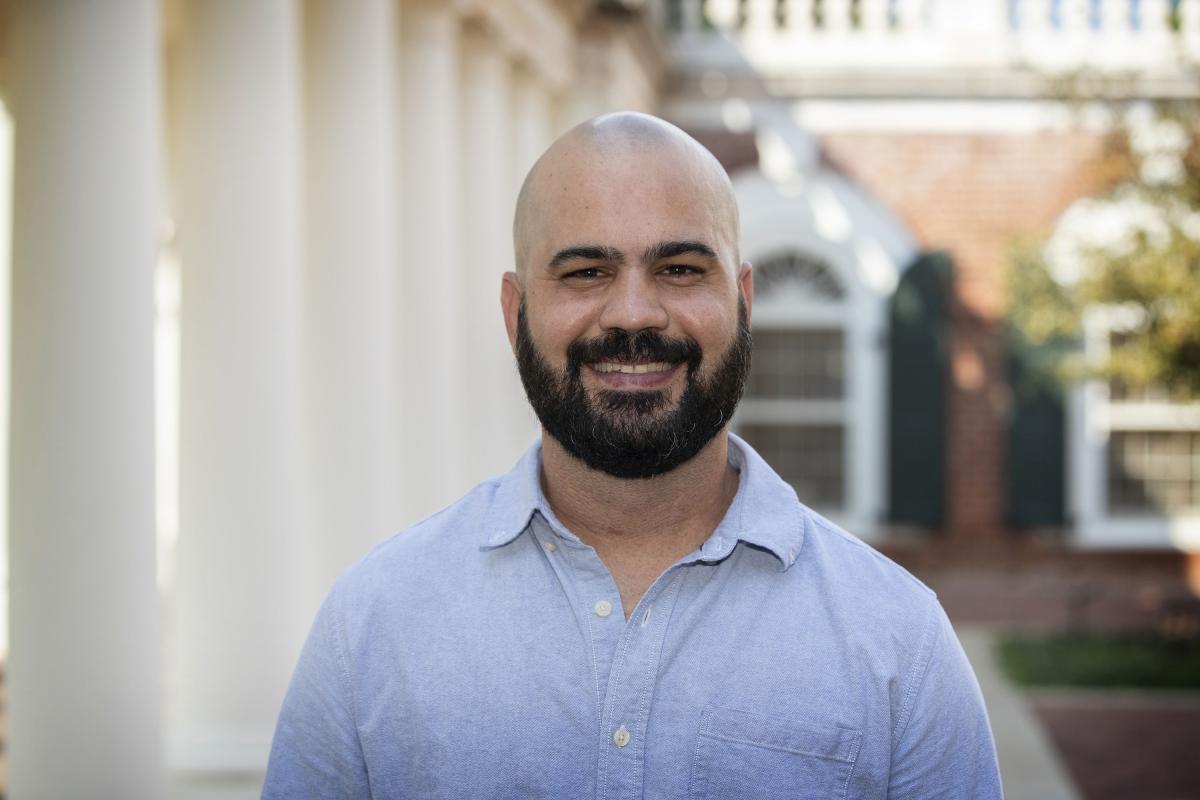
Ernesto Benitez
Department of Anthropology
Specialties: development, ecotourism, sex tourism, indigeneity, masculinity, South America, Ecuador, Amazonia.
Ernesto Benitez holds a PhD in Global and Sociocultural Studies with a concentration in Sociocultural Anthropology from Florida International University (2021). His long-term research is grounded in a decade-long ethnographic engagement with the Amazonian Kichwa (also spelled Quichua) people of Ecuador’s Napo province. He has paid particular attention to the ecotourism boom that occurred in Ecuador’s Upper Amazon in the early 1990s and the impact it has had on the livelihoods and identities of Kichwa people, many of whom have gradually shifted from agricultural and subsistence-based activities to service-based work in ecotourism. His dissertation offers an ethnographic account of how Kichwa tour guides in Napo, the vast majority of whom are young men, negotiate the demands and expectations of the ecotourism industry and how, in the process, they produce and enact new understandings of their ethnic, gendered, and sexual identities.
Publications: 2021- Erazo, Juliet and Ernesto Benitez. “Becoming Politicians”: Indigenous Pageants as Training Sites for Public Life. (Forthcoming on American Anthropologist).

Janet Kong-Chow
pwc6kc@virginia.edu
Department of Engish and Department of American Studies
Janet Kong-Chow is a Rising Scholars Postdoctoral Fellow in American Studies and English at the University of Virginia. Her teaching and research are broadly concerned with diaspora, imperialism, and North American culture, examining overlapping processes of racialization, power, and language. She is committed to interdisciplinary research, specializing in theories of racial capitalism, the environment, disability, postcolonialism, the African diaspora, transnationalism, and legal studies.
Her first book project, Securing the Crisis: Race and the Poetics of Risk, considers metaphors of risk as a corollary to 21st century American crisis and racialization. Reading relationally across poetry, photography, ethnography, legislation, film, and sculpture, the project advances the notion of a “poetics of risk” and contends that racialized and minoritized subjects deploy epistemological abstraction and fragmentation not only as resistance, but to rework conventions of periodicity, materialism, and reality we accept as hegemonic. Her second manuscript, Race and Other Accumulative Affects: Hoarding, Curation, and the Modern Archive, locates dispossession, anticipation of emergency, and speculative accumulation as critical affective questions at the intersection of U.S. migration, diaspora, race-making, and cultural preservation.
Kong-Chow earned her B.A. in English and History from the University of Pennsylvania and her Ph.D. in English from Princeton University. Her work has been supported by the Andover Institute for the Recruitment of Teachers (IRT) and the Mellon Foundation.
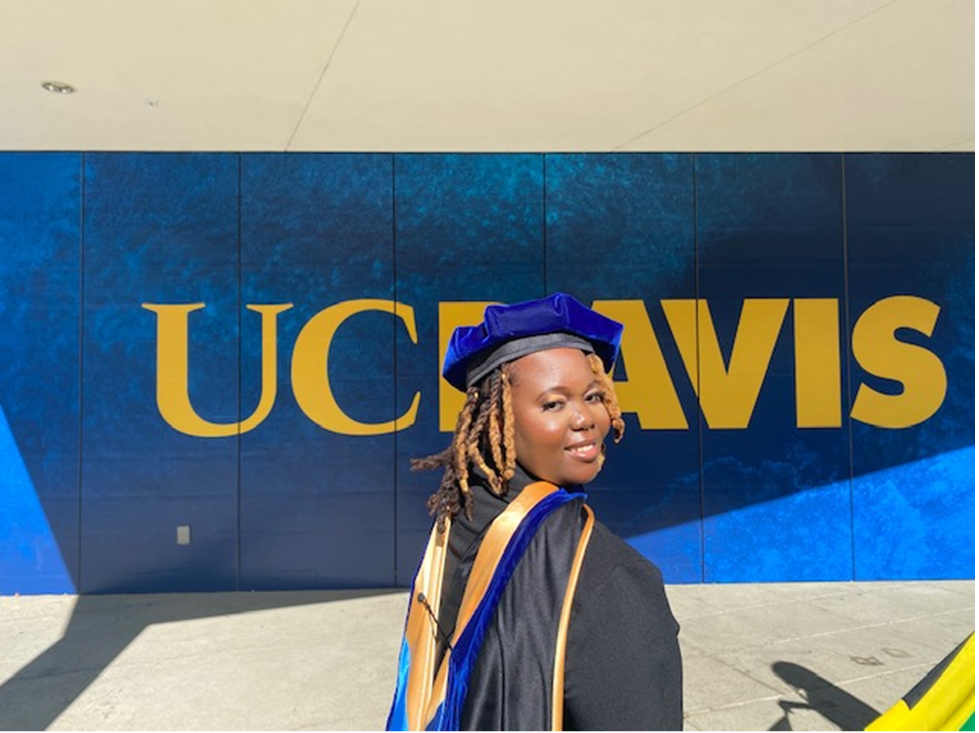
Rashana Lydner
rvl5ew@virginia.edu
Department of French
Rashana Vikara Lydner holds a Ph.D. in French and Francophone Studies with a Designated Emphasis in African and African American Studies (African Diaspora Studies) from the University of California, Davis. She earned her Bacherlor’s degrees in French and Spanish with a minor in Psychology, and her Master’s in French from the University of California, Davis. Her work mainly focuses on a transnational approach to the study of Black Popular Culture in the Caribbean basin (Francophone/Anglophone) at the intersections of language, identity and power. At the core of her research is her passion for Creole languages in the Caribbean. Her work highlights how speakers of Creole languages continue to challenge dominant language ideologies and embrace their multilingualism.
Research interests: Creolistics (the study of creole languages); Contact Linguistics, Language and Racialization; Language and Globalization; Language, Gender, and Sexuality; Black France; Caribbean Identity; Black popular culture (Music, social media, etc.), African Diaspora Theory; Black and Third world Feminist thought; Queer Theory.
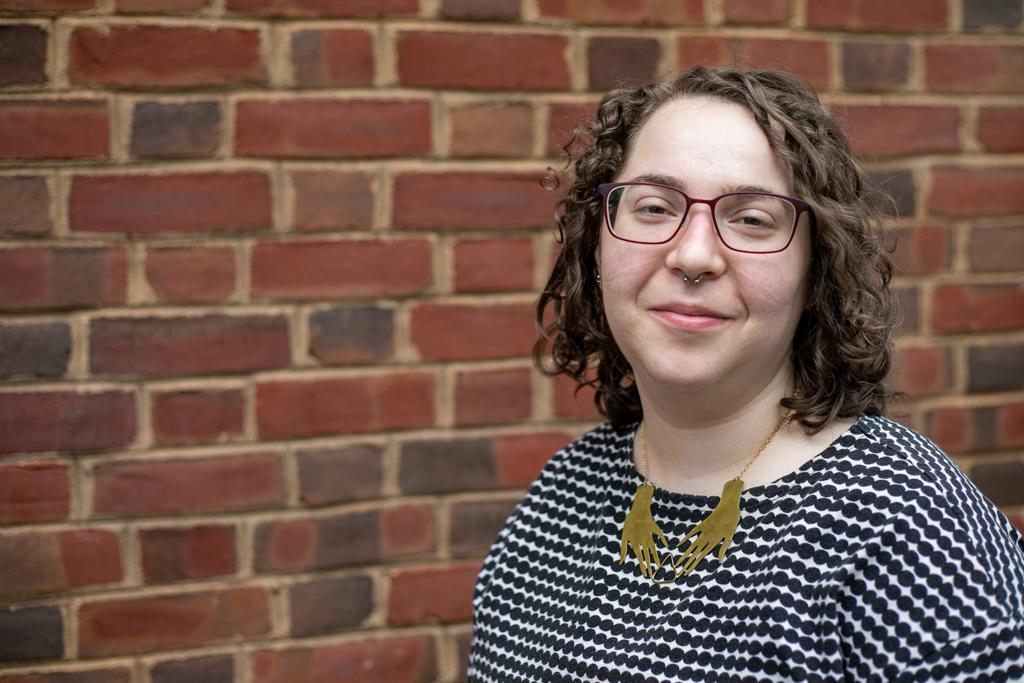
Sarah Orsak
egv2uj@virginia.edu
Department of Women, Gender & Sexuality
Sarah Orsak is a scholar of feminist disability studies. She uses literary and cultural analysis to investigate the imbrications of disability, race, gender, and nation. Orsak’s current research project investigates how disability has cohered as an identity and category of analysis linked to whiteness in the contemporary United States. This research foregrounds how racist ideas of Black womanhood structure dominant ideas of disability.
Sarah Orsak holds a PhD in Women’s, Gender, and Sexuality Studies from Rutgers University—New Brunswick and her work has been supported by the Mellon Foundation and the Rutgers Center for Research on Women.

Ryan Richards
wsk4cj@virginia.edu
Department of Physics
My name is Ryan Richards, and I was born in Brooklyn, NY. I did my undergraduate studies in Physics at SUNY Albany and my PhD studies at SUNY Stony Brook, specializing in experimental nuclear physics. My dissertation research involved studying the neutral weak force between electrons and nuclei using fixed target parity-violating electron scattering. Through parity-violating electron scattering, we can probe novel properties of nuclear matter in a model-independent way through measurements of the fractional difference of cross sections between positive and negative helicity electrons. I was involved in the PREX (208Pb Radius) experiment at Jefferson Lab which aimed to measure the neutron skin in a 208Pb nucleus. The 208Pb nucleus has 44 more neutrons than protons, so it is believed that the extra neutrons form a skin around the nucleus. The neutron skin is correlated with the density dependence of the symmetry energy L. This same density dependence is also correlated with the size of neutron stars despite the difference in size between a neutron star and a 208Pb nucleus because they are made up of the same stuff, neutrons. Therefore, the PREX result will provide input in describing the equation of state of neutron matter.
Fixed target parity-violating asymmetry measurements are typically on the order of 10-7, so suppressing systematic contributions is important. One example of a systematic comes from residual transverse beam polarization. The transverse polarization couples to the vector analyzing power AT which can be larger or comparable to the size of the parity-violating asymmetry. Therefore, direct measurements quantifying the size of the analyzing power were taken. These measurements were the subject of my thesis.

Leticia Ridley
yqr3hh@virginia.edu
Department of Drama
Dr. Leticia L. Ridley's primary teaching and research areas include African American theatre and performance, Black feminisms, Black performance theory, and popular culture. Leticia earned a PhD in Theatre and Performance Studies from the University of Maryland, College Park and her research has been funded by the Ford Foundation (where she was a Predoctoral Fellow) and the Mellon-funded African American Digital Humanities program (AADHum). She has presented her scholarship at numerous conferences including the Association for Theatre in Higher Education, American Society for Theatre Research, National Women’s Studies Association, and the American Studies Association. Leticia has published scholarly essays in Frontiers: A Journal of Women’s Studies, the August Wilson Journal, Routledge Anthology of Sports Plays, Journal of American Theatre and Drama, and Contemporary Black Theatre and Performance: Acts of Rebellion, Activism, and Solidarity (forthcoming). Leticia is also the co-producer and co-host of Daughters of Lorraine, a Black feminist theatre podcast, which is supported by HowlRound Theatre Commons and a recurring co-host on On Tap: A Theatre & Performance Studies Podcast. She is also a freelance dramaturg.
Leticia’s manuscript-in-progress employs a Black feminist methodology to examine contemporary Black women’s performance culture. Her book, divided into four chapters, analyzes the construction and performance of hypervisibility by Black women artists and entertainers from the United States: the visual art of Carrie Mae Weems, the Broadway musicals dedicated to the lives of Tina Turner and Donna Summer, the visual and sonic disruptions of athlete Serena Williams, and the technological performance praxis of musician Beyoncé Giselle Knowles-Carter. This study argues that contemporary Black women artists utilize the historically contingent and fraught dynamic of hypervisibility as a generative mechanism for Black feminist performance.

Erica Sterling
mth6uq@virginia.edu
Department of History
Erica Sterling is a Rising Scholars Postdoctoral Fellow in the History Department. Her research focuses on the history of education law and policy, and twentieth-century U.S. urban and philanthropic history. Her book project tells an intellectual history of federal education politics from 1954 to 1994; she interrogates how federal bureaucrats and philanthropists, education researchers and practitioners theorized and developed non-judicial alternatives for large segregated school systems of the North and West untouched by Brown v. Board of Education (1954). Erica holds her BA in History and Psychology from Emory University, and her PhD in History from Harvard University.
Rising Scholars Alumni
Mauricio Herrera Acuña
dwb2cx@virginia.edu
Department of Spanish, Italian & Portuguese and Program in Global Studies
Subject: Literature; Race & Ethnicity; Art; Cultural Studies; Digital Humanities; Comparative Studies.
Region: Africa & African Diaspora; Brazil; Caribbean; Latin America.
Period: 20th-21st centuries.
Mauricio Acuña is a scholar of Afro-Latin American Studies, specializing in modern and contemporary literatures and cultures of African Diaspora in the Americas, with a special focus on Brazil and Cuba. His research interests include the poetics, performances and aesthetics of Afro-diasporic artists and intellectuals, Black internationalisms in the Global South, race relations, anti-racist practices between Africa and the Americas, and Digital Humanities applied to spatial translation of aesthetics. As a Rising Scholar postdoctoral fellow in the Global Studies Program and Department of Spanish, Italian, and Portuguese, Acuña will develop his book project, Poetics and Performances of Afro-Atlantic Imaginations: The First World Festival of Negro Arts, which explores how previously understudied Afro-Latin American artists and writers shaped the aesthetic creations, anti-racist politics, and the rise of a Black Internationalism in the South Atlantic between 1930-2010. He is the author of the book A ginga da nação: intelectuais na capoeira e capoeiristas intelectuais (Editora Alameda, 2015), honorable mention of the Silvio Romero Prize from the National Institute of Historic and Artistic Heritage, Ministry of Culture, Brazil, and the co-editor of Marcadores sociais da diferença: fluxos, trânsitos e intersecções (UFG Publisher, 2018). Acuña also collaborated on the new critical edition of Sérgio Buarque de Holanda’s Raízes do Brasil (Companhia das Letras, 2016). His work appears in journals such as Sociologia & Antropologia, Revista Trilhos, Biblioteca Virtual do Pensamento Social and PROA. At UVA, Mauricio is eager to participate in research collaborations like the Global South Lab, the Greater Caribbean Studies Network, the Latin American Studies Program, and the Scholar’s Lab.

Abunya Agi
evp2fk@virginia.edu
Department of PsychologyDr. Abunya Agi is a Rising Scholars Postdoctoral Research Fellow in the Department of Psychology. Her research explores the way Black adolescents and emerging adults navigate their racial(ized) identities and cultural values (such as spirituality) to promote positive life outcomes in spite of anti-Black racism. As a Nigerian-born Canadian, Dr. Agi also considers the role of immigrant generation status for Black youth in the U.S. and Canada.
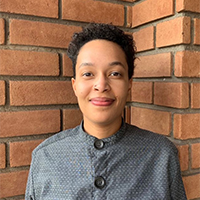
Kat Cosby
bmw6gc@virginia.edu
Department of Women, Gender, and Sexuality
Kat Cosby is a Rising Scholars Postdoctoral Fellow in the Women, Gender, and Sexuality Department. They are an interdisciplinary scholar whose work focuses on Black women and their geographies in Brazil in the post-abolition era.
Their book manuscript interrogates how the presence and contributions of Black women and the attempts to erase them historically from geographies in São Paulo were essential to the formation and development of the city. Kat examines how criminalizing Black women's presence was crucial to whitening ideology and practices in the early twentieth century.
Kat Cosby received their Ph.D. in History from the University of California, Irvine.

Siddhant Issar
kty3ds@virginia.edu
Department of Politics
Siddhant Issar is a Rising Scholar Postdoctoral Fellow in the Department of Politics at the University of Virginia. His research and teaching interests lie in modern and contemporary political theory, the Black Lives Matter movement, and the politics of race, class, and settler colonialism in the US. His work has been published in Contemporary Political Theory, Race & Class, The Black Scholar, and in an edited volume, Creolizing Rosa Luxemburg. Currently, Issar is working on a book manuscript, titled Theorizing Racial Capitalism in the Era of Black Lives Matter.
Issar holds a Ph.D. in Political Science from the University of Massachusetts, Amherst and a B.A. and M.A. from Wesleyan University and The Graduate Center, City University of New York, respectively.
